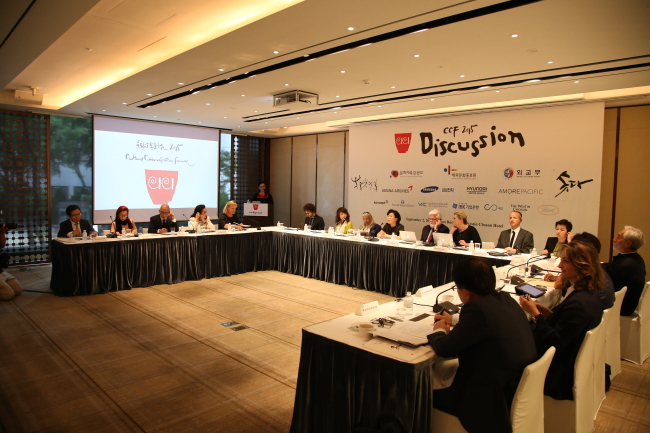The culture community should not see new media technology as a threat but an opportunity that can help many people to gain greater access to information and interest in culture, said participants at the Culture Communication Forum 2015 in Seoul.
Under the theme of "Cultural Combustion in the Smart Age," some 20 delegates from G20 economies, including Korea, participated in the forum hosted by the Corea Image Communication Institute to discuss about social media technology and its effects on culture worldwide.
 |
Foreign delegates discuss the effects of new media technology on culture and share stories on Korea at the Culture Communication Forum 2015 in Seoul on Wednesday. (Core Image Communication Institute) |
Jean d'Haussonville, general director of the National Estate of Chambord in France, said that new media technology will not decrease people's consumption of culture, but further increase it, as seen from the world's past experience with radio, television and printing.
"New technology has spread culture, and will not end with culture disappearing," said d'Haussonville at the forum at the Westin Chosun Hotel in Seoul.
"Nothing will be replaced, and it will enhance direct human experience in culture areas like food and architecture."
Although new technology will bring challenges, all industries including the arts will need to find ways that can increase value and immersive experience for cultural consumers.
"I always think about how it can enhance the experience, and be an opportunity for content to be further shared with the world," said Philippe Magid, executive director of Bangarra Dance Theatre, who has been working in the Australian performing arts for 14 years.
Arina Sharapova, a TV journalist from Russia, also agreed that social media can get people more interested and make them want to be at the art scenes.
"It can offer the chance to know (culture) better, and can be used for good diplomacy," she said.
Terry Mosher, a political cartoonist from Canada, said new media technology offered great advantages, as it can reach a larger number of people in a short time, unlike conventional media platforms such as newspapers.
"I finish my cartoon, which then can be published one day before the newspaper. That is a great advantage," said Mosher.
"The age will come when more people will see on computers or mobile devices, and less so in print."
Kim Hyun-taek, director of the Institute of Russian Studies at Hankuk University of Foreign Studies, also said that cartoons about social problems on new media platforms such as webtoons can help people understand latest issues in-depth at the shortest time.
Also, the older generation should learn and embrace new technology to narrow the cultural gap with the younger generation.
"And we must not forget that culture is made from sharing and converging different arts," said Kim.
Foreign delegates not only participated in the forum but also visited renowned museums such as the National Gugak Center and the National Museum of Modern and Contemporary Art, and tourist attractions, including Insa-dong and Changdeokgung Palace, to experience Korea's culture over the last three days.
The CICI is an organization aimed at promoting Korea's culture and image to bridge the gap between the world and Korea. The host seeks to develop the CC Forum, which is in its sixth year, to be a cultural Davos Forum.
By Park Hyong-ki (
hkp@heraldcorp.com)








![[Today’s K-pop] Blackpink’s Jennie, Lisa invited to Coachella as solo acts](http://res.heraldm.com/phpwas/restmb_idxmake.php?idx=644&simg=/content/image/2024/11/21/20241121050099_0.jpg)